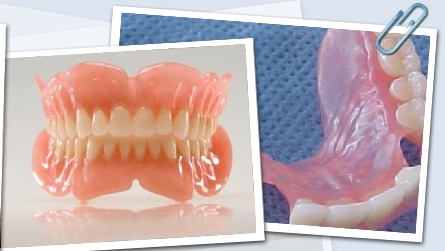|
|
 |

|

|

What are Dentures?
| |
Dentures are replacements for missing teeth that can be taken out and put back into your mouth. While dentures take some getting used to, and will never feel exactly the same as one's natural teeth, today's dentures are natural looking and more comfortable than ever.
There are two main types of dentures: full and partial. We will help you choose the type of denture that's best for you based on whether some or all of your teeth are going to be replaced.
|
How do Dentures Work?
| |
With full dentures, a flesh-colored acrylic base fits over your gums. The base of the upper denture covers the roof of your mouth, while that of the lower denture is shaped like a horseshoe to accommodate your tongue.
Dentures are custom-made in a dental laboratory from impressions taken of your mouth. We will determine which of the three types of dentures described below is best for you.
Conventional Full Denture
A conventional full denture is placed in your mouth after any remaining teeth are removed and tissues have healed. Healing may take several months, during which time you are without teeth.
Immediate Full Denture
An immediate full denture is inserted immediately after the remaining teeth are removed. (Dr. Melucci takes measurements and makes models of your jaw during a prior visit.) While immediate dentures offer the benefit of never having to be without your teeth, they must be adjusted several times and relined after tissues have fully healed. The reason is that the bone supporting the teeth reshapes as it heals, causing the denture to become loose.
Partial Denture
Partial dentures offer a removable alternative to bridges. The partial denture rests on a metal framework or can be comprised of lightweight, practically invisible, and more comfortable biocompatible nylon thermoplastic that attaches to your natural teeth. Sometimes crowns are placed on some of your natural teeth and serve as anchors.
|
How Long Before I Get Used to My Dentures?
| |
New dentures may feel awkward or uncomfortable for the first few weeks or even months. Eating and speaking with dentures might take a little practice. A bulky or loose feeling is not uncommon, while the muscles of your cheeks and tongue learn to hold your dentures in place. Likewise, excessive saliva flow, a feeling that the tongue does not have adequate room, and minor irritation or soreness are not unusual. If you experience irritation, make an appointment to see the dentist.
|
How Long do Dentures Last?
| |
Over a period of time, your denture will need to be relined, remade, or rebased due to normal wear. Rebasing is the process of making a new base while keeping the existing denture teeth. Also, as you age, your mouth naturally changes. These changes cause your dentures to loosen, making chewing difficult and irritating your gums. At a minimum, you should see your dentist annually for a checkup.
~ Family & Cosmetic Dentistry ~
JOHN C. MELUCCI, D.D.S. ~ 3733 Poplar Avenue ~ Castle Shannon, PA 15234
Phone: 412.531.6804 ~ Email: jcmeluccidds@comcast.net
www.meluccidds.com
|
|
|
|
|
|
|

|
|
|
|
|
|
 |




























